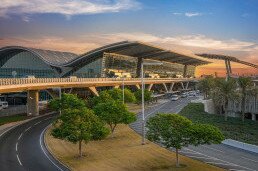
June 2019: Passengers up 2.1% in Asia-Pacific and 8.1% in the Middle East
- 02 Sep 2019
Passenger traffic in Asia-Pacific and the Middle East recorded growth in June at +2.1% and +8.1% respectively.
In China, the overall passenger growth this month was negatively impacted by adverse weather conditions in southern and eastern China, which caused significant flight cancellations at many airports. The domestic sector showed signs of weakening, while international demands remained solid. The top three airports with the most passenger volume increase from last year were: Guangzhou (CAN) +5.1%, Shanghai Pudong (PVG) +3.9% and Shenzhen (SZX) +5.9%.
In India, passenger traffic demand showed resilience. Both the international and domestic segments recovered to positive growth this month as the market filled in the capacity gap created by Jet Airways’ service suspension. The three airports with the most passenger volume growth were: Hyderabad (HYD) +9.8%, Bangalore (BLR) +4.4% and Ahmedabad (AMD) +10.4%.
The Middle East recorded robust performance this month at +8.1%. Many airports benefited from the shift in timing of Ramadan and reported positive results. Airports with the highest volume increase from last year: Doha (DOH) +19.2%, Dubai (DXB) +4.2% and Sharjah (SHJ) +17.5%.
Overall year-to-date passenger traffic in Asia-Pacific and the Middle East grew +1.9% and +2.5% respectively. Major markets such as China, India and the United Arab Emirates all experienced slowdown in the first quarter and showed signs of improvement in the second quarter. Looking ahead, the macro-economic environment remains challenging particularly for Asia-Pacific with rising tensions between Japan and South Korea and the escalating trade disputes between China and the United States.
Air freight markets continued to deteriorate, Asia-Pacific and the Middle East declined at -6.5% and -7.1% respectively in June. Hangzhou (HGH) was the only airport that posted a positive growth rate among the top 20 air freight hubs, at +4.2%. The growth was largely driven by the increased handling capacity and network expansion of express couriers.
Overall, air freight slowed in the first half of 2019, with Asia-Pacific at -5.9% and the Middle East at -2.7%. The escalating trade tensions between China and the United States continued to put pressure on the exports and manufacturing activities in the region.










